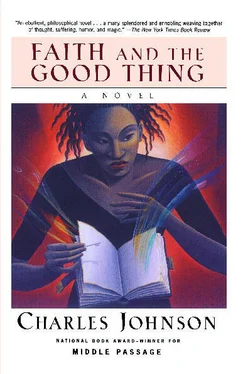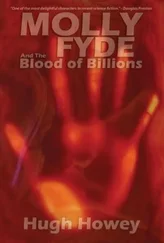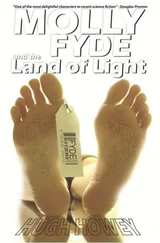“I reckon,” Lavidia said. “I try not to think ‘bout it too much. It’s like you said at the last meetin’: the best thing in the world is inside us.”
“I said that?” Brown looked at her quizzically, then snapped his fingers. “Yes!” he shouted. “I did say that!” He jumped to his feet, stood still for a moment, then spun on his heels. “That is what I said, isn’t it?” A smile split his mouth; he slammed his palms together and laughed. “I wasn’t thinkin’ right! That child, Jennie, is in a better world — she’s saved. She’s thrown off that box she was trapped in, and there ain’t nothin’ separatin’ her from the most real thing of all!” Brown straightened his coat, regaining himself, happy now. He smiled at Lavidia, and touched her arm. “That space between Him and us ain’t so flamin’ wide after all, is it?” He said, “Thank you, Sister Cross,” and took his leave. As for Faith,
She jumped, stupefied, to her feet. Shouted, “There’s nothing there!” They were looking at her now; she’d shattered the mood of sanctity and peace in the Church of Continual Light. She didn’t care. Her thoughts rose as a veil before her vision, recalling her times spent walking across the city at the blackest pitch of night before the break of dawn, at that time so like a sick man’s momentary slumber. State Street, parallel to the lakefront and glistening with melted snow, was silent. There she would walk, then along the misty, moonlit beaches, thinking, inuring herself to this life in the depths of the cave, but always certain that something about her remained vernal, clean, and beyond it all. It was a transparent time, akin to the great space between a gremlin’s hourly heartbeats, or between a zombie’s outstretched arms. Inner and outer worlds flowed back and forth beneath the integument of her skin like water in a pipe. She remembered sitting on the hard Civic Center benches beneath Picasso’s wraithlike statue, feeling that flow and sensing for the first time that what was outside — in the world, on its streets, and behind its façade of buildings — stole within her at times, and was balanced by her own soul’s emanation, altering that world with compassion, her father’s legacy of mythopoesis and love. But in this church,
She leaned against the empty wooden seat in front of her, and made a witness to the truth: it was a one-way street. Warmth did not burst outward from her, filling the world with dreams, but the city, strangely like a burial place at that odd, half-remembered hour, had invaded her, made her, shaped her wholly, because there was nothing in here as the minister up front and Reverend Brown maintained. All was out there. Faith looked at the minister. He awaited an explanation for her outburst. She saw through him to the wall behind. He, too, was nothing — life was a play of shadows and mist on the marmoreal wall of a cave.
“What is your name?” he said sharply.
“Name?” Faith wondered — should a thing as transitory as a human life have a name? It was a stupid convention, but she decided to play the game. “It’s Faith Cross.”
“And what will you tell us, child?”
Because it hurt so bad Faith set it free. “I came to Chicago looking for the one true Good Thing, the one thing that would end everyone’s bondage, and would bring us all out of the dark!” Tears dropped from her eyes and made her cheeks shine, and she felt herself hovering again between the wish and its impossibility. “I believed in it — I was devoted to it, just like you said. I looked for it, because I knew it had to be! Don’t you see? Wasn’t it possible that there were all kinds of things around us that we never knew about until we looked for them? Wasn’t there a purpose just waiting to show itself to someone who looked?”
The minister’s brow knitted with deep lines and furrows as thick as a well-plowed field. “It’s within you, child—”
“I looked there, too!” Faith cried. She sensed the weight, saw the horror of her realization. “That’s too easy. You all stopped looking in the world because it was too hard. You tricked yourselves!” Something solid and stiff seemed to flip over in her stomach, fell to the floor of her stomach, and lie there like a log. “There’s nothing inside, and there’s nothing outside—”
A curl stiffened the minister’s lower lip. He screwed his mouth to the right side of his dark face, the edges of his white teeth visible as he frowned. “When people see things the way you do, we say they’ve got the Evil Eye. It’s a false way of seeing life — it’s like wearing dark glasses that blind you to the truth of things. You’ve got it, child — a belief that’s an argument for the Pit.” He scratched his cheek nervously and glared at her. “And if thine eye offends thee—”
“What?” Faith said coolly. Her composure returned, creeping in beneath her fatigue. “Should I change my glasses, or tear out my eyes, or pretend the Good Thing was always inside me, or—” She stopped, looking around the room at the drawn, startled faces. They were drained and almost the color of unleavened bread. Faith stepped into the aisle, drew her coat close around her, and turned to the minister. “Or should I use this darkness and suffering to get what I need?” It didn’t matter that he failed to understand. Faith saw him step down from the podium and start after her when she reached the door.
“Sit down on the moaning bench,” he called. “Fawn, if you confess—”
“It’s Faith,” she said. Her thoughts were sharp and clear. “My name is Faith Cross.”
“Fawn or Faith,” he said, his arms open to her, “does it matter?”
“Yes.” She pulled shut the door, returned to the bus stop, and rode to State Street and Washington where she walked for a while. Thinking: this is home — a strangely ordered city seething beneath its veneer of rigidity and regulation with growing pockets of anarchy, theft, murder, a death every day, and crimes which the authorities suppressed quickly, like a finger dousing a candle’s flame. All night the city’s lamps were lit, all night the borders of order buckled and receded and were reinstated before day. A losing battle. The truth would steal into this and every city like a Mongol horde, turning dreams into nightmares, incrusting even the most brilliant, self-certain careers with the dust and decay of time. Walking through the garment industry, along the obscure, reeking canal, then in and out of the weaving maze of curio shops, wax museums, and opium dens that was Old Town, Faith considered the possibility of release. There could be nothing good, or true, or beautiful when inner and outer worlds were as empty as she divined. There could only be small comforts, the solace of bittersweet illusion that her customers seemed to enjoy. She walked on, stopping to sit on the rocks near the frozen lake, and feeling, as she remembered the window displays in the Loop, anger strong enough to slay a troll in its tracks. One had to be independent of fortune, to be comfortable in the cave. To wear those fine furs she saw draped over manikins in store windows and on the slim shoulders of the haughty women who paraded down the streets: this is what she wanted, what she swore to achieve. She looked toward the apartment buildings rising above Chicago’s skyline, imagining how those women, less nice-looking, less cute than she, lived — in the sky, warm, well fed, as free as one could be in the endless mad flux of things. “The Good Thing,” she said. All bitterness. The sound of it made her sick. The minister had, in a small sense, been right: you had to bring your goals closer. Call them by another name. It was too hard to look, to suffer frustration, and keep searching in the face of probable defeat. It was true: you had to settle on some thing, to make your peace with your dreams and take, when the chance came, what you could get. Peace of mind. What else mattered? Inside her, the waves resounded. She looked at the sand beneath her feet, at the small impressions the thin soles of her shoes had made. Before dawn the wind would have erased them. None would know she’d sat there; in time, she would slip out of the world like a shadow. It reinforced her conviction, giving her strength to start back to the hotel, planning, vowing that, if nothing else, she would trample if need be the heads of thousands, and their ridiculous theories as well to get what she needed. She would number her days, but only to squeeze from each whatever comfort could be secured.
Читать дальше












